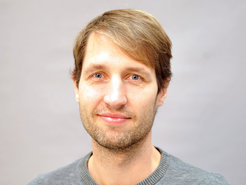David Zwicker joins the EMBO Young Investigator Network
The research group leader from the Max Planck Institute for Dynamics and Self-Organization (MPIDS) has been selected to become a new member of the EMBO community of young researchers. David studies the physical principles of the organization of biological matter. Together with 25 other researchers, as of January 2022 he will join an international platform through which young investigators have access to a variety of networking opportunities and funding.
As stated in their press release, Michael N. Hall, EMBO Director ad interim, the selected candidates “have already demonstrated scientific excellence despite only recently launching their own laboratories. The EMBO Young Investigator Programme will aid them in taking their career to the next level.” For David Zwicker, this is an excellent support for his research activities at the MPIDS: What are the organizational principles behind the thousands of different kinds of molecules which eventually form a biological cell? This is one of the key questions of his work. Despite rapid biochemical reactions and fast movement of many individual molecules, they yet form structures that exist stably. Such a robust organization is critical for cells to fulfill their function; however, the underlying principles often remain mysterious.

Currently, his research is focused on understanding biomolecular condensates, which are droplets that participate in most cellular processes. They can, for example, be found in transcription, cellular signaling, and also stress response. While the basic theory of phase separation explaining such droplet formation is well understood in physics, a complex environment such a biological cell poses new challenges. In particular, it is unclear how such a crowded and noisy cellular environment affects droplet dynamics. To this end, David develops fundamental physical theories and specific descriptions of biological systems in collaboration with experimentalists. Using a range of theoretical tools, including statistical physics, dynamical system theory, fluid dynamics, and information theory, he wants to predict how cells regulate biomolecular condensates and other intracellular structures.
Being part of the Young Investigator Network also allows selected candidates benefit from a variety of networking and training opportunities and have access to core facilities at the European Molecular Biology Laboratory (EMBL) in Heidelberg, Germany. Along those lines, David Zwicker is looking very much forward to the exchange with his fellow scientists:
“I feel honored to be included in this program by EMBO, particularly as a physicist. I think this shows that understanding life is an inter-disciplinary problem and that we will make the most progress when people with diverse backgrounds work together. I'm looking forward to the discussions with the other scientists over the coming years!”
